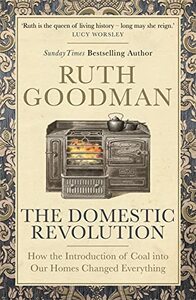Take a photo of a barcode or cover
hopeful
informative
slow-paced
informative
The Domestic Revolution by Ruth Goodman is about the changes of household fuels from peat and wood to coal, and how it changed people's lives.
Thoughts while reading:
-I’ve never really given fuel sources this much thought
-I was aware that modern cow pats are really soft and runny but I never thought that it was because of the change of diet and the high nutrition (I was aware that people used to burn dung for fuel though)
-it’s pretty unfortunate that although peat burned for a long time and was ‘less maintenance,’ it also releases more fine particles so its worse for your lungs
-This book makes me feel very ill-equipped for survival-type situations. I didn’t realize that burning certain types of wood, like willow, could result in acrid types of smoke that hurt to breathe
-It makes sense that the technology that people used were made to optimize the burning of their preferred fuel, like wood
-The issue of dealing with smoke from fires must have been unpleasant. I had never considered how there was sulphur in coal, which reacts with water, so if it made people tear up, their eyes would burn
-I never considered the innovations in smoke management before chimneys (which were expensive), or that having your heat source at one side of the room would be far less efficient than a fire in the middle
-This book is so much more interesting than I imagined it would be. I never thought about how fuel sources, and the different way that they burn, would affect cooking so much, or how the introduction of coal into households influenced recipes that focused more heavily on boiling, which coal cooking did well
-I suppose it shouldn't be surprising that people in Britain stubbornly held on to old dishes like roasting meat, even if it was inconvenient with coal, as a matter of status and tradition
-I liked learning about the different ways people washed their homes and their kitchenware, with wood ash being easy to sweep away since it didn’t stick to anything, in contrast to coal smut, which was sticky and left a mess if you tried to wipe it. It sounded very effective for people to wash their wooden bowls with cloth and bits of sand, which effectively ‘sanded’ the bowls clean
-The poems about the slovenly women, who used dogs’ tongues to wash dishes, and dogs’ wagging tails to dry them, was funny
-Interesting to learn about the dominance of soap, and how it was equated with morality
The book ended up being far more interesting than I thought, with a lot of insightful details that I never would have considered. I also like how the author had first hand experience with using the different fuels and cleaning devices. I would give this a 4.5 out of 5
Thoughts while reading:
-I’ve never really given fuel sources this much thought
-I was aware that modern cow pats are really soft and runny but I never thought that it was because of the change of diet and the high nutrition (I was aware that people used to burn dung for fuel though)
-it’s pretty unfortunate that although peat burned for a long time and was ‘less maintenance,’ it also releases more fine particles so its worse for your lungs
-This book makes me feel very ill-equipped for survival-type situations. I didn’t realize that burning certain types of wood, like willow, could result in acrid types of smoke that hurt to breathe
-It makes sense that the technology that people used were made to optimize the burning of their preferred fuel, like wood
-The issue of dealing with smoke from fires must have been unpleasant. I had never considered how there was sulphur in coal, which reacts with water, so if it made people tear up, their eyes would burn
-I never considered the innovations in smoke management before chimneys (which were expensive), or that having your heat source at one side of the room would be far less efficient than a fire in the middle
-This book is so much more interesting than I imagined it would be. I never thought about how fuel sources, and the different way that they burn, would affect cooking so much, or how the introduction of coal into households influenced recipes that focused more heavily on boiling, which coal cooking did well
-I suppose it shouldn't be surprising that people in Britain stubbornly held on to old dishes like roasting meat, even if it was inconvenient with coal, as a matter of status and tradition
-I liked learning about the different ways people washed their homes and their kitchenware, with wood ash being easy to sweep away since it didn’t stick to anything, in contrast to coal smut, which was sticky and left a mess if you tried to wipe it. It sounded very effective for people to wash their wooden bowls with cloth and bits of sand, which effectively ‘sanded’ the bowls clean
-The poems about the slovenly women, who used dogs’ tongues to wash dishes, and dogs’ wagging tails to dry them, was funny
-Interesting to learn about the dominance of soap, and how it was equated with morality
The book ended up being far more interesting than I thought, with a lot of insightful details that I never would have considered. I also like how the author had first hand experience with using the different fuels and cleaning devices. I would give this a 4.5 out of 5
Hard to imagine a much more interesting book about the English switch to burning coal in the domestic sphere. Does what it sets out to do.
My version's subtitle changes "our homes" to "Victorian homes," which is a poor change. Inaccurate by a couple centuries for most of the book's content.
My version's subtitle changes "our homes" to "Victorian homes," which is a poor change. Inaccurate by a couple centuries for most of the book's content.
Fascinating look at the domestic changes that brought the Industrial Revolution into being.
informative
medium-paced
While I appreciate the narrow but exhaustive focus, the organization of the material and some of the personal examples I thought detracted from the overall historical narrative Goodman was attempting to create. However, I did come away with some interesting facts I will share when teaching this material.
This is an engaging, well-written account that straddles the line between academic monograph and popular history, mostly successfully. It shines when Goodman describes her personal experiences with old methods of cooking and cleaning. I found her thesis compelling and do wish we had more ability to immerse ourselves in the landscapes and households of the past — albeit as visitors only!
informative
inspiring
reflective
slow-paced
I really enjoyed this book. I learned so much about things I had never thought about (such as historic woodland management and the difference between cooking on a wood fire versus a coal fire), and view historic recipes in a completely new way. I recommend this highly.
informative
medium-paced
DNFed with regret. The content was interesting, but I couldn't get past the narration of the audiobook. And it's not even that the narration is bad, per se, just that it's delivered with a strong accent (RP/SSB) that I found distracting and that kept stopping me want to continue. Might revisit some day if I ever get hold of a print or ebook copy.



